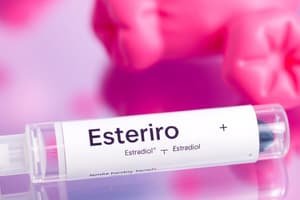Podcast
Questions and Answers
What is the primary organ for the development of T cells?
What is the primary organ for the development of T cells?
- Bone marrow
- Liver
- Spleen
- Thymus (correct)
Central tolerance ensures that all self-reactive lymphocytes are eliminated during development.
Central tolerance ensures that all self-reactive lymphocytes are eliminated during development.
False (B)
Which autoimmune disease mechanism is primarily associated with immune complexes?
Which autoimmune disease mechanism is primarily associated with immune complexes?
- Type II
- Type IV
- Type I
- Type III (correct)
Hormonal differences between sexes do not influence the incidence of autoimmune diseases.
Hormonal differences between sexes do not influence the incidence of autoimmune diseases.
What process do developing B cells undergo to change their specificity if they are self-reactive?
What process do developing B cells undergo to change their specificity if they are self-reactive?
The ability of thymic epithelial cells to express a vast number of proteins helps in the process of ______.
The ability of thymic epithelial cells to express a vast number of proteins helps in the process of ______.
What is the relationship between sex hormones and immunity in women?
What is the relationship between sex hormones and immunity in women?
The severity of autoimmune diseases generally __________ over time.
The severity of autoimmune diseases generally __________ over time.
Match the following immune tolerance mechanisms with their descriptions:
Match the following immune tolerance mechanisms with their descriptions:
Which autoimmune disorder often arises from defects in central tolerance?
Which autoimmune disorder often arises from defects in central tolerance?
Match the following hypotheses with their related concepts in autoimmunity:
Match the following hypotheses with their related concepts in autoimmunity:
Which factors can complicate the diagnosis of autoimmune diseases?
Which factors can complicate the diagnosis of autoimmune diseases?
Hormonal influences can affect the immune response and play a role in autoimmunity.
Hormonal influences can affect the immune response and play a role in autoimmunity.
What type of T cells help regulate immune responses and may influence autoimmunity?
What type of T cells help regulate immune responses and may influence autoimmunity?
Type I hypersensitivity reactions are often involved in autoimmunity.
Type I hypersensitivity reactions are often involved in autoimmunity.
Name one challenge in diagnosing autoimmune diseases.
Name one challenge in diagnosing autoimmune diseases.
Autoimmune diseases are classified by the __________ or the proposed mechanism of pathogenesis.
Autoimmune diseases are classified by the __________ or the proposed mechanism of pathogenesis.
Which type of autoimmune disease mechanism is NOT often implicated in autoimmunity?
Which type of autoimmune disease mechanism is NOT often implicated in autoimmunity?
Which factor is the dominant genetic influence on susceptibility to autoimmune disease?
Which factor is the dominant genetic influence on susceptibility to autoimmune disease?
Which of the following statements best describes autoimmune diseases?
Which of the following statements best describes autoimmune diseases?
Which of the following best describes molecular mimicry?
Which of the following best describes molecular mimicry?
Sympathetic Ophthalmia is a condition that occurs when trauma to one eye leads to an autoimmune reaction affecting only that eye.
Sympathetic Ophthalmia is a condition that occurs when trauma to one eye leads to an autoimmune reaction affecting only that eye.
The testes and placenta are not considered immune-privileged tissues.
The testes and placenta are not considered immune-privileged tissues.
Approximately 80% of autoimmune diseases are diagnosed in females.
Approximately 80% of autoimmune diseases are diagnosed in females.
What is the significance of the HLA-B27 allele in relation to ankylosing spondylitis?
What is the significance of the HLA-B27 allele in relation to ankylosing spondylitis?
What is the term used for the acquired lack of immunological reactivity to an antigen?
What is the term used for the acquired lack of immunological reactivity to an antigen?
What is the significance of treating strep throat aggressively with antibiotics?
What is the significance of treating strep throat aggressively with antibiotics?
In autoimmune diseases, the immune response tends to ____ and ____, causing cycles of immune activation.
In autoimmune diseases, the immune response tends to ____ and ____, causing cycles of immune activation.
The release of normally 'sequestered' antigens due to tissue trauma can activate T cells against these antigens, such as those found in the _____ and _____ eye.
The release of normally 'sequestered' antigens due to tissue trauma can activate T cells against these antigens, such as those found in the _____ and _____ eye.
Self-reactive T cells may be activated during an immune response due to __________ of APCs presenting self-antigens.
Self-reactive T cells may be activated during an immune response due to __________ of APCs presenting self-antigens.
Match the following terms with their definitions:
Match the following terms with their definitions:
Match the following genetic factors or immune responses with their descriptions:
Match the following genetic factors or immune responses with their descriptions:
Match the following autoimmune phenomena to their explanations:
Match the following autoimmune phenomena to their explanations:
What is the role of regulatory T cells in autoimmunity?
What is the role of regulatory T cells in autoimmunity?
What role do regulatory T cells play in autoimmune diseases?
What role do regulatory T cells play in autoimmune diseases?
Environmental exposures have no impact on the development of autoimmune diseases.
Environmental exposures have no impact on the development of autoimmune diseases.
Environmental factors have no impact on the development of autoimmune diseases.
Environmental factors have no impact on the development of autoimmune diseases.
What does 'relative risk' refer to in the context of HLA alleles and autoimmune diseases?
What does 'relative risk' refer to in the context of HLA alleles and autoimmune diseases?
Name one commonly recognized factor that influences the incidence of autoimmune diseases between sexes.
Name one commonly recognized factor that influences the incidence of autoimmune diseases between sexes.
Individuals with the __________ allele are more likely to develop ankylosing spondylitis.
Individuals with the __________ allele are more likely to develop ankylosing spondylitis.
The sustained adaptive immune response directed against self is known as an autoimmune _____.
The sustained adaptive immune response directed against self is known as an autoimmune _____.
Which of the following is a diagnostic challenge in autoimmune diseases?
Which of the following is a diagnostic challenge in autoimmune diseases?
Which of the following statements about autoimmune diseases in monozygotic twins is true?
Which of the following statements about autoimmune diseases in monozygotic twins is true?
Flashcards are hidden until you start studying
Study Notes
Tolerance and Autoimmunity
-
Lymphocytes generate diverse receptors for antigens, leading to self-reactive clones.
-
Central Tolerance: Occurs in primary lymphoid organs (thymus for T cells, bone marrow for B cells).
- Strongly self-reactive T and B cells undergo negative selection; self-reactive T cells are deleted in the thymus while B cells may undergo receptor editing.
- Defects in this process can lead to various autoimmune disorders.
-
Mechanisms of Tissue Injury: Classified by hypersensitivity types, primarily Types II-IV.
- Many autoimmune diseases exhibit features of multiple hypersensitivity reactions.
- Diagnosis is complicated by overlapping clinical, pathologic, and serologic characteristics.
Sex Differences in Autoimmunity
-
A higher incidence of autoimmune diseases is observed in females, potentially due to:
- Sex hormones' impact on immune responses.
- Genetic factors such as incomplete X-inactivation.
-
Trauma can expose the immune system to new antigens; testes and placenta are immune-privileged but still retain some immune capacity.
Genetic and Environmental Influences
-
Genetic Factors:
- HLA (MHC locus): Dominant in autoimmune susceptibility, with relative risk varying among individuals.
- Genetic variations can predispose individuals to specific diseases; the presence of certain alleles does not guarantee disease development.
-
Monozygotic Twin Studies: Show increased frequency of autoimmune diseases, but concordance rates are often less than 100%.
-
Environmental Factors:
- Bystander activation occurs when APCs present self-antigens during immune responses to pathogens, activating self-reactive T cells.
- Absence of other diseases may indicate contributions to autoimmune pathology.
General Concepts of Autoimmunity
- Autoimmune disease is a sustained immune response against self-antigens, damaging host tissues.
- There are over 80 known autoimmune diseases, causing widespread morbidity globally.
- Tolerance is the lack of immune response to self and can be induced in T and B cells, primarily observed in fetal or young animals.
Characteristics of Autoimmunity
- Autoimmunity involves both genetic and environmental factors.
- There is a pronounced frequency difference in autoimmune diseases between sexes, with females accounting for approximately 80% of cases.
- Autoimmune phenomena often "wax and wane," influenced by regulatory T cells mediating suppression.
Mechanisms Inducing Autoimmunity
-
Molecular Mimicry: Cross-reactivity between pathogen and self-antigens may lead to autoimmune responses, exemplified by rheumatic fever (Streptococcal antigens affecting myocardial tissue).
-
Tissue Trauma: Can release sequestered antigens, prompting autoimmune reactions.
-
Superantigens: Exotoxins that cause widespread, non-specific CD4 T cell activation, contributing to autoimmune diseases.
Studying That Suits You
Use AI to generate personalized quizzes and flashcards to suit your learning preferences.




